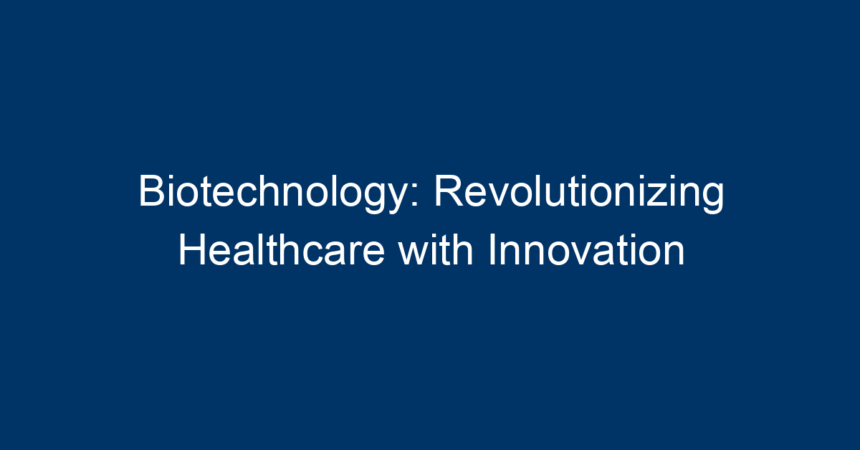In the ever-evolving landscape of healthcare, biotechnology stands out as one of the most transformative forces. Straddling the realms of biology and technology, biotechnology merges scientific knowledge with innovative practices to create solutions that not only improve patient outcomes but also address pressing global health challenges. From personalized medicine to advanced diagnostics, this article dives deep into the various facets of biotechnology that are revolutionizing healthcare today.
Understanding Biotechnology
Biotechnology refers to the use of biological systems, organisms, or derivatives to develop or create different products. The field encompasses various technologies, including genetic engineering, molecular biology, cell culture, and bioinformatics. By harnessing the power of living systems, biotechnology has redefined the ways we approach disease prevention, diagnosis, and treatment.
The Historical Context of Biotechnology
While the term "biotechnology" has gained prominence in recent decades, its roots trace back thousands of years. Ancient civilizations utilized fermentation processes to produce bread, beer, and cheese—early examples of biotechnological applications. However, modern biotechnology truly began to unfold in the 20th century with the discovery of DNA’s structure and the development of recombinant DNA technology in the 1970s. These advancements paved the way for groundbreaking treatments and therapies that continue to shape healthcare today.
Key Applications of Biotechnology in Healthcare
1. Personalized Medicine
One of the most exciting advancements in biotechnology is personalized medicine. By analyzing an individual’s genetic makeup, healthcare providers can tailor treatments that are most effective for that person. This approach minimizes trial and error, reducing the time to find suitable therapies and increasing success rates.
For instance, biotechnology enables oncologists to identify specific mutations in cancer tumors, facilitating more targeted therapies that attack cancer cells while sparing healthy ones. This advancement not only improves survival rates but also enhances the quality of life for patients.
2. Biopharmaceuticals
Biopharmaceuticals are medicinal products derived from biological sources. They include a wide range of products such as monoclonal antibodies, vaccines, and recombinant proteins. These biologics have revolutionized treatment for chronic diseases such as diabetes and rheumatoid arthritis.
Monoclonal antibodies, for example, are engineered to bind specific antigens on cancer cells or pathogens, offering targeted therapy with fewer side effects compared to traditional treatments. The development and production of these biologics rely heavily on biotechnological techniques, highlighting the crucial role biotechnology plays in healthcare innovation.
3. Gene Therapy
Gene therapy is another groundbreaking biotechnological application. It involves altering the genes inside a patient’s cells to treat or prevent disease. By correcting defective genes responsible for disease development, gene therapy holds promise for conditions like cystic fibrosis, hemophilia, and certain forms of cancer.
Recent advancements in technologies like CRISPR have made gene editing more precise and accessible. This innovation not only enhances the effectiveness of existing therapies but also opens the door to entirely new treatments for genetic disorders.
4. Diagnostics and Biomarkers
Advancements in biotechnology have also led to the creation of sophisticated diagnostics. Techniques such as PCR (Polymerase Chain Reaction) and next-generation sequencing are now commonplace, enabling rapid and accurate detection of diseases.
Biomarkers—biological indicators of disease states—are also a significant focus. By identifying specific biomarkers associated with various conditions, healthcare providers can diagnose diseases earlier and with greater accuracy. This proactive approach improves outcomes and can even save lives.
The Role of Startups and Innovation Hubs
1. Emerging Companies in Biotechnology
The biotechnology sector has seen a surge in startups that are pushing the boundaries of what’s possible. These companies often bring fresh ideas and innovative solutions to the table, focusing on unmet medical needs. Collaborations between biotech firms and established pharmaceutical companies have also become key in accelerating the development of new treatments.
2. Innovation Hubs
Innovation hubs play a crucial role in fostering biotechnological advancements. Regions with a concentration of biotech firms, academic institutions, and research facilities create an environment primed for innovation. For example, the San Francisco Bay Area has established itself as a global center for biotechnology, attracting talent, investment, and resources.
Regulatory Challenges and Ethical Considerations
1. Navigating Regulations
While biotechnology offers immense potential, it also faces regulatory hurdles. Ensuring the safety and efficacy of biopharmaceuticals and therapies is vital, which requires extensive clinical trials and regulatory approval processes. Navigating these complexities can be time-consuming and expensive, posing challenges for both large pharmaceutical companies and startups.
2. Ethical Implications
The advancements in biotechnology also raise ethical questions. Genetic editing, stem cell research, and cloning are just a few areas where ethical considerations come into play. It’s essential to address these issues and engage in open dialogues about the implications of biotechnological advancements on society.
Future Trends in Biotechnology
1. Artificial Intelligence and Machine Learning
As technology continues to advance, the integration of artificial intelligence (AI) and machine learning with biotechnology is becoming increasingly common. These technologies can analyze large datasets to help identify patterns in diseases, predict patient responses to treatments, and streamline drug discovery processes.
2. Synthetic Biology
Synthetic biology represents a frontier in biotechnology where researchers design and construct new biological parts and systems. This innovative field has the potential to revolutionize areas like biofuels, environmental remediation, and sustainable agriculture—extending its impact beyond healthcare.
3. Telemedicine and Remote Monitoring
The rise of telemedicine and remote patient monitoring solutions, accelerated by the COVID-19 pandemic, has shown how biotechnology can enhance healthcare delivery. Wearable devices and telehealth platforms are facilitating patient monitoring and enabling healthcare providers to offer timely interventions.
Actionable Insights
To leverage the benefits of biotechnology in healthcare effectively, consider the following actionable insights:
-
Stay Informed: Keep up with the latest advancements in biotechnology by following reputable journals and news outlets.
-
Patient Engagement: Healthcare providers should involve patients in discussions about personalized treatment options and emerging biotechnological therapies.
-
Advocate for Research Funding: Support initiatives that fund biotechnological research and innovation, as this plays a crucial role in driving advancements that can benefit society at large.
-
Ethical Considerations: Engage in discussions about the ethical implications of biotechnological advancements, ensuring that innovation is balanced with moral responsibility.
- Educate the Public: Foster public understanding of biotechnology’s benefits and challenges through outreach and educational programs.
Conclusion
Biotechnology is undeniably revolutionizing the healthcare landscape. From personalized medicine and gene therapy to advanced diagnostics, its applications are vast and varied. While future trends promise even more exciting developments, challenges remain. Engaging with these challenges through active dialogue, ethical considerations, and ongoing research will ensure that biotechnology continues to improve patient outcomes and transform lives for generations to come. Embracing this innovation is not just a medical advancement; it’s a global necessity for sustainable health solutions.




